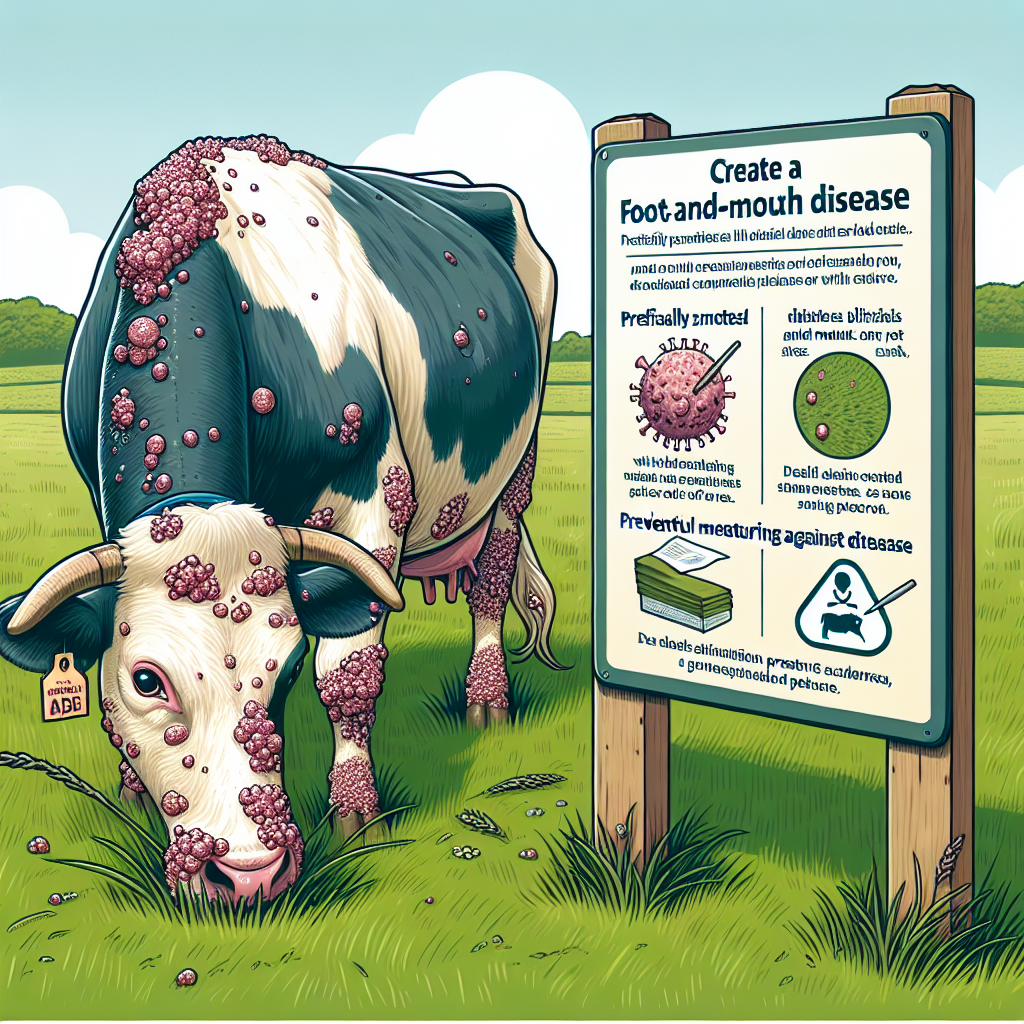North West Hit by Foot-and-Mouth Outbreak; Farms Quarantined, Vaccines Deployed
This latest outbreak adds to South Africa’s ongoing battle with the highly contagious viral disease, which affects cloven-hoofed animals such as cattle, sheep, goats, and pigs.

- Country:
- South Africa
The North West Department of Agriculture and Rural Development has confirmed a new outbreak of foot-and-mouth disease (FMD) in the Dr Kenneth Kaunda District, with the epicentre located in the JB Marks Local Municipality. The development has triggered containment measures, quarantine protocols, and escalated national-level biosecurity responses amid an already concerning pattern of FMD incidents across several provinces.
This latest outbreak adds to South Africa’s ongoing battle with the highly contagious viral disease, which affects cloven-hoofed animals such as cattle, sheep, goats, and pigs. The outbreak poses a significant threat to the country’s livestock industry, food security, and trade relations.
Details of the Outbreak: Two Confirmed Incidents
The first case was identified after a private veterinarian reported suspicious clinical signs while attending to livestock on a farm in JB Marks. A follow-up investigation by a State veterinarian led to the collection of biological samples, which were sent to the Onderstepoort Veterinary Institute (OVI). Laboratory analysis confirmed the presence of the foot-and-mouth virus.
In a separate incident, FMD was detected at an abattoir in Madibeng during post-slaughter inspections. Although the ante-mortem inspection failed to identify any symptoms, abnormalities were detected on the slaughter line, prompting further examination.
-
Lab results confirmed the presence of both SAT 2 and SAT 3 strains of the FMD virus.
-
The unslaughtered animals were returned to their originating feedlot in Ventersdorp, escorted under a Red Cross permit, as required under animal disease control protocols.
Containment Measures: Quarantine and Tracing
Both farms involved in the outbreak have been placed under strict quarantine, which prohibits any movement of animals, animal products, equipment, or feed from the premises. Authorities have also traced linked farms, especially those connected to a recent Gauteng outbreak, and placed them under precautionary quarantine pending test results.
The department has deployed teams to:
-
Conduct mass sampling and testing on suspect herds
-
Monitor adjoining farms
-
Enforce biosecurity guidelines
-
Increase surveillance in trade routes
“All suspected cases of FMD must be immediately reported to the nearest state veterinarian,” the department urged.
Understanding FMD: Symptoms and Economic Risks
FMD is one of the most economically devastating livestock diseases due to its rapid spread and severe trade implications. While not transmissible to humans, it causes:
-
Fever and lameness
-
Painful blisters on the mouth, feet, and teats
-
Production losses due to reduced milk yield and weight loss
The disease spreads easily via direct contact, contaminated surfaces, animal movement, and aerosols under certain environmental conditions. Control measures are critical to avoid international trade restrictions and domestic supply disruptions.
National Response: Vaccination and Biosecurity Council
In response to the rising number of outbreaks—now reported in five of South Africa’s nine provinces, including KwaZulu-Natal, Gauteng, Limpopo, Mpumalanga, and North West—the national Department of Agriculture has launched an aggressive vaccination drive.
-
Over 901,200 doses of FMD vaccines have been ordered at a cost exceeding R70 million
-
Vaccinations are being rolled out in high-risk zones, with priority given to KwaZulu-Natal, Limpopo, Mpumalanga, and Gauteng
-
Routine vaccination schedules will continue in endemic provinces such as Limpopo and Mpumalanga, where immunisation occurs three times annually
Earlier this month, Agriculture Minister John Steenhuisen emphasized the urgency of a coordinated and well-funded biosecurity plan. He highlighted the government’s efforts to:
-
Increase veterinary capacity
-
Strengthen lab diagnostics
-
Improve cross-border controls
To institutionalize these efforts, Cabinet has announced the formation of a national Biosecurity Council. This multidisciplinary body will include:
-
Representatives from SAPS, Border Management Authority (BMA)
-
Leading veterinarians and scientists
-
Private sector stakeholders from agriculture and food industries
The council will be tasked with developing rapid-response mechanisms, improving national surveillance systems, and strengthening cross-sectoral coordination in managing transboundary diseases like FMD.
Call to Action: Industry and Public Vigilance Needed
Authorities are urging livestock farmers, abattoirs, auctioneers, and traders to remain vigilant and comply with:
-
Movement control regulations
-
Animal health reporting requirements
-
Biosecurity protocols at farms and processing units
Livestock owners are also advised to:
-
Avoid moving animals across districts or provinces unless absolutely necessary
-
Disinfect vehicles and equipment used in animal handling
-
Isolate new or returning animals for observation
“We are in a critical phase. Cooperation from the agricultural community is essential to contain and eliminate this outbreak,” a senior provincial official said.
As the North West becomes the latest flashpoint in South Africa’s FMD landscape, authorities at both provincial and national levels are ramping up efforts to prevent further spread, protect animal health, and ensure that agricultural livelihoods are not disrupted by avoidable disease outbreaks.
- READ MORE ON:
- Foot-and-mouth disease
- North West outbreak
- JB Marks Municipality
- SAT 2 virus
- Onderstepoort Veterinary Institute
- FMD quarantine
- South Africa livestock
- biosecurity council
- vaccine deployment
- agricultural biosecurity
- John Steenhuisen
- SAPS
- animal health South Africa
- FMD symptoms
- SAT 3 strain
- livestock disease control










